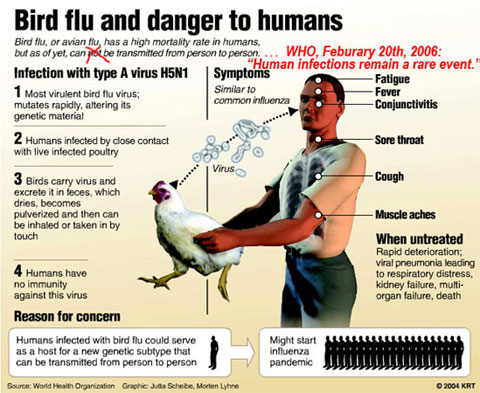April 18 (Punjab Khabarnama) : Bird flu outbreak in Kerala’s Alappuzha has left health authorities in the district worried. According to a PTI report, the disease was confirmed in ducks reared in an area of ward 1 of Edathva Grama Panchayat and another area in ward 3 of Cheruthana Grama Panchayat, as per officials after their sample tested positive for avian influenza (H5N1).
Bird flu, also known as avian influenza, has been a cause of worry globally due to its potential to infect humans. In the light of recent spread of infection among ducks in Kerala, it is important to know about the symptoms, and prevention of the disease. It also raises concern about the possible spread of the avian influenza virus in humans. Here’s what the experts have to say.
“Symptoms of bird flu in humans can vary but often include fever, cough, sore throat, muscle aches, and difficulty breathing. In severe cases, it can lead to pneumonia/ARDS and respiratory failure,” says Dr. Ankur Gupta, Consultant – Internal Medicine, Fortis Escorts, Okhla Road, New Delhi.
“Bird flu, also known as avian influenza, is a viral infection that primarily affects birds. However, in some cases, it can spread to humans, causing illness ranging from mild to severe. The symptoms of bird flu in humans are similar to those of regular influenza and may include fever, cough, sore throat, muscle aches, fatigue, and respiratory difficulties. In severe cases, it can lead to pneumonia and even death,” says Dr Rahul Agarwal Consultant Internal Medicine CARE Hospitals Hitech City Hyderabad.
The recent outbreak of bird flu in Alappuzha, Kerala, demands urgent attention for public health. The Avian Influenza virus, primarily affecting birds, poses a significant risk to human health as it can spread to humans, leading to severe respiratory illness and potentially fatal outcomes.
“In response to this outbreak, the Animal Husbandry Department in Kerala has initiated several crucial measures aimed at controlling the spread of the virus, including upgrading laboratory networks, establishing diagnostic facilities, and introducing lateral flow kits for rapid field-level disease diagnosis,” says Dr Puneet Gupta, Head – Department of Pulmonology, Interventional Pulmonology and Sleep Medicine, Yatharth Super Specialty Hospital, Noida Extension.
How does it spread in humans?
“Humans can catch bird flu through close contact with infected birds, including touching them, their droppings, or bedding, or killing or preparing them for cooking. The most likely way for a human to catch bird flu is through exposure to birds, bird faeces, or feathers. Water birds such as wild ducks are believed to be the carriers of all avian influenza type A viruses. If someone has been in close contact with infected birds and exhibits these symptoms, it’s crucial to seek medical attention promptly,” says Dr Gupta.
“Avian influenza can be transmitted to humans through close contact with infected birds or their excretions, as well as through person-to-person transmission via respiratory droplets. Therefore, it is imperative that we emphasize preventive measures to mitigate the spread of the virus. This includes practicing good hygiene, avoiding direct contact with infected birds or their droppings, and wearing masks in areas where the virus is prevalent,” says Dr Puneet.
Does the disease spread from birds to humans?
“The spread of bird flu from birds to humans is rare. Globally, from January 1, 2003, to February 26, 2024, 887 cases of human infection with bird flu were reported from 23 countries. Of these 887 cases, 462 were fatal (CFR of 52%), as per the World Health Organisation), and sustained human-to-human transmission is even rarer (no report till date in India). However, the potential for the virus to mutate and become more transmissible among humans is a concern for public health authorities. Monitoring and containment efforts are crucial to prevent outbreaks and minimize the risk of a pandemic,” says Dr Gupta.
Treatment of bird flu
“Treatment for bird flu usually involves antiviral medications, such as oseltamivir (Tamiflu), which can help reduce the severity and duration of symptoms. However, the effectiveness of these medications may vary depending on the strain of the virus and the individual’s overall health,” says Dr Rahul Agarwal Consultant Internal Medicine CARE Hospitals Hitech City Hyderabad.
“In addition to antiviral medications, supportive care is often necessary, especially for individuals experiencing severe symptoms. This may include rest, hydration, and, in some cases, hospitalization for close monitoring and treatment,” adds Dr Agarwal.
Prevention tips
“Prevention is key to reducing the risk of bird flu. Avoiding contact with sick birds, practicing good hygiene such as washing hands frequently, and properly cooking poultry products are essential measures. Additionally, wearing protective gear when handling sick birds or cleaning contaminated areas can further reduce the risk of transmission,” says Dr Gupta of Fortis Hospital.
“As with any infectious disease outbreak, it’s essential to follow public health guidelines and recommendations. This may include practicing good hygiene, such as frequent handwashing, avoiding contact with sick birds or poultry, and taking precautions when handling raw poultry products,” says Dr Agarwal.
“While bird flu outbreaks can be concerning, the risk of human-to-human transmission is generally low. However, health authorities closely monitor these outbreaks to prevent the spread of the virus and protect public health. Staying informed and following the guidance of health officials can help mitigate the risks associated with bird flu,” adds Dr Agarwal.
Is it concerning?
The confirmation of the H5N1 avian influenza, commonly known as bird flu in Alappuzha district is a concerning development. Bird flu is a highly contagious viral infection that primarily affects birds, caused by influenza viruses that normally circulate among wild aquatic birds.
“The H5N1 strain is particularly concerning as it has a high pathogenicity and it can cause severe illness and high mortality rates in infected bird populations. Prompt action including strict biosecurity measures, and vigilant surveillance, is crucial to mitigate the economic and environmental impact of such outbreaks on poultry farming and the potential risk to public health,” says Dr Suranjit Chatterjee Senior Consultant, Internal Medicine, at Indraprastha Apollo Hospital.
“It is important to note that while human cases of H5N1 are rare, the virus can potentially cross the species barrier and infect humans through close contact with infected birds or contaminated environments. Therefore, it is important for poultry workers, farmers, and individuals in affected areas to exercise caution and practice good hygiene,” adds Dr Chatterjee.
“While the presence of bird flu in Kerala is concerning, it’s essential to avoid panic and instead focus on taking proactive measures to prevent transmission. Overall, while vigilance is warranted, there’s no need for undue alarm. By staying informed, following preventive measures, and seeking medical attention if experiencing symptoms, individuals can help reduce the risk of bird flu transmission and protect public health,” concludes Dr Gupta.



